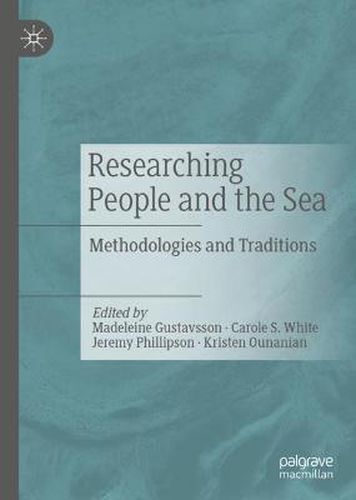Readings Newsletter
Become a Readings Member to make your shopping experience even easier.
Sign in or sign up for free!
You’re not far away from qualifying for FREE standard shipping within Australia
You’ve qualified for FREE standard shipping within Australia
The cart is loading…






This title is printed to order. This book may have been self-published. If so, we cannot guarantee the quality of the content. In the main most books will have gone through the editing process however some may not. We therefore suggest that you be aware of this before ordering this book. If in doubt check either the author or publisher’s details as we are unable to accept any returns unless they are faulty. Please contact us if you have any questions.
In this unique edited collection, social scientists reflect upon and openly share insights gathered from researching people and the sea. Understanding how people use, relate to and interact with coastal and marine environments has never been more important, with social scientists having an increasingly vital contribution to make. Yet practical experiences in deploying social science approaches in this field are typically hidden away in field notes and unpublished doctoral manuscripts, with the opportunity for shared learning that comes from doing research often missed. There is a need for reflection on how social science knowledge is produced.
This collection presents experiences from the field, its necessary reflexivity and innovation in methods, and the challenges and opportunities of translating across disciplines and policy. It brings to light the tacit expertise needed to study people and the sea and offers lessons which readers could employ in their own research. With a focus on the future direction of marine social sciences, the volume is highly relevant to masters and doctoral students and more experienced researchers engaged in studying people and the sea, as well as policy makers, practitioners and scientists wishing to understand the social dimension of marine and coastal environments.
Chapters 2 and 3 are available open access under a Creative Commons Attribution 4.0 International License via link.springer.com.
$9.00 standard shipping within Australia
FREE standard shipping within Australia for orders over $100.00
Express & International shipping calculated at checkout
This title is printed to order. This book may have been self-published. If so, we cannot guarantee the quality of the content. In the main most books will have gone through the editing process however some may not. We therefore suggest that you be aware of this before ordering this book. If in doubt check either the author or publisher’s details as we are unable to accept any returns unless they are faulty. Please contact us if you have any questions.
In this unique edited collection, social scientists reflect upon and openly share insights gathered from researching people and the sea. Understanding how people use, relate to and interact with coastal and marine environments has never been more important, with social scientists having an increasingly vital contribution to make. Yet practical experiences in deploying social science approaches in this field are typically hidden away in field notes and unpublished doctoral manuscripts, with the opportunity for shared learning that comes from doing research often missed. There is a need for reflection on how social science knowledge is produced.
This collection presents experiences from the field, its necessary reflexivity and innovation in methods, and the challenges and opportunities of translating across disciplines and policy. It brings to light the tacit expertise needed to study people and the sea and offers lessons which readers could employ in their own research. With a focus on the future direction of marine social sciences, the volume is highly relevant to masters and doctoral students and more experienced researchers engaged in studying people and the sea, as well as policy makers, practitioners and scientists wishing to understand the social dimension of marine and coastal environments.
Chapters 2 and 3 are available open access under a Creative Commons Attribution 4.0 International License via link.springer.com.